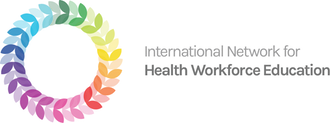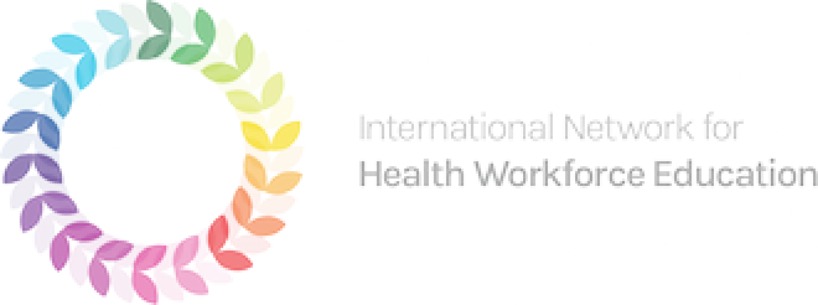Athens 2018 Abstract book now available! We are pleased to announce that the Athens 2018 abstract book is now available electronically. You can now download and view the abstracts to each presentations by clicking here.
Conference Programme (please note this is a Provisional Programme. Date, time, and title of the sessions can change)
- Thursday 24th May 2018, 09.30-11.00
Inter-Professional Education Session
World Health Organisation states that after almost 50 years of enquiry, there is significant evidence to indicate that effective inter-professional education is a key innovative strategy that enables effective collaborative practice and that it plays an important role in mitigating the global health workforce crisis. This session focuses on inter-professional education with four presentations on the topic from a practice and research perspective.
2018114 “Strengthening Interprofessional Collaboration through Joint Learning Seminars (SiHaKo)"
2018106 Seeing the bigger picture: The influence of national culture on Interprofessional Education (IPE)
2018148 Developing an interprofessional online medication system for people with long term conditions
2018141 Non-linear asynchronous human patient simulation as an advanced method for teaching healthcare provi
Intercultural Session
The EU Skills Panorama (2014) states that health professionals should develop their skills in line with broader societal trends and influences. In the context of increasing mobility and high numbers of displaced persons, researchers and policymakers have also added their voices to calls to develop the range and quality of intercultural competences. This session provides three different examples of how to improve intercultural education.
2018109 Skills in conflict management and negotiation of diagnostic and therapeutic technicians
2018149 Intercultural issues experienced by international students on practice placement in the UK
2018152 Greek Nursing Workforce and Transcultural Competencies in Healthcare Provision
- Thursday 24th May 2018, 11.00-12.30
Communication Session
There is an increasing need within health systems for effective communication between all stakeholders in patients’ care. Effective communication between health professionals and patients has been found to have a positive impact on decreasing readmission rates, understanding treatment options, saving costs, and improving overall health outcomes for patients. This session addresses multiple examples of improving health workforce communication.
2018115 Coaching approaches among medical students, health professionals and individuals in their educational environment
2018127 International analysis of dentist needs in terms of interpersonal communication with patient
2018134 The Significance of a Sensory Garden in the Formation of “the Room of Closeness”
2018144 Developing Medical English Courses which Reinforce Patient Centered Communication Skills, Involve Intercultural Training and Instil Leadership Skills
Panel Session: Gender Barriers in Health Workforce Sustainability
Vulnerabilities in health systems underscore the need for competent and inclusive healthcare leadership. Gender inequalities such as unequal opportunities in education, recruitment and career advancement, stereotypes and work/life imbalance, impede development of such comprehensive leadership. The workshop aims to show how the lack of gender equality, diversity and leadership adversely impact upon health and development outcomes; how healthcare workforce diversity could equalize opportunities and overcome barriers to achieve efficient governance and sustainability responsive to pressing needs of patients, the health workforce and systems.
2018123 Gender Barriers in Health Workforce Sustainability
- Thursday 24th May 2018, 13.30-14.00
Lunch Session: CultureMee
Have you ever experienced culture shock? This entertaining icebreaker, run by our conference partners CultureMee, aims to challenge people’s perspectives about where they’re from, what culture means to them and why it is important. CultureMee have found that trying to explain culture, the importance of it and the relevance of it, can sometimes be challenging if you do not find ways to bring culture to life for people. Therefore, this lunch session will provide a light-hearted look at culture which will help frame future discussions on intercultural training, communication and leadership in healthcare.
- Thursday 24th May 2018, 14.00-15.30
Leadership Session
In health systems today, leadership is not confined to those in management positions. It has been proven that leadership development improves leadership behaviours and better leadership leads to better patient care. Policy makers are placing an increasing emphasis on health workforce leadership development and this session analysis’s a range of tools, models, programmes and expertise to support educators, research and those in policy positions to implement and assess leadership development in their own country.
2018102 Leadership development for undergraduate nursing students through action learning sets
2018112 What is caring in nursing leadership – a meta-synthesis
2018118 Clinical leadership: how can we define and recognize leaders in bedside nursing care?
2018132 Shaping the future of Clinical Research: Advanced Leadership Programme
Interactive Workshop
The workshop will discuss the importance of intercultural competences and communication in the professional-patient relationship. Furthermore, InterHealth’s mobile application on ethnological perspective and diverse illness-perceptions of patients will be demonstrated. The session will incorporate a breeding ground for networking and exchange of good practices on providing healthcare services to people coming from diverse cultural backgrounds.
2018163: InterHealth Project: Intercultural Competences for Healthcare Professionals
- Thursday 24th May 2018, 15.30-17.00
Panel Session: The Greek Crisis & Healthcare Education
Over the past decade Greece has been in crisis. Economically Greece has suffered with high debts, capital controls and fractious negotiations with the European Union and other creditors. More recently Greece has been thrust into the forefront of the refugee crisis. Both issues have combined to create a public health emergency within the country. This panel session discuss how Greece has tried to deal with these issues with presentations on direct training, migrant health and governmental response.
A detailed Panel description can be found here.
* * *
- Friday 25th May 2018, 09.30-11.00
Leadership Session
Leadership training for health professionals has been on the rise since the early 1990’s when ‘new public management’ catapulted leadership skills to the top of the public-sector agenda. Rising financial pressures have placed an ever-increasing responsibility on health professionals to conduct their activities with the wider health system in mind. This session takes a holistic view of leadership for the health workforce within the complete health system.
2018105 Systems thinking in education: preparing for leading innovation in complex dynamic health systems
2018135 Developing A Leadership Attributes Development Tool for Pharmacists
2018151 Profession leadership though professional societies: driving workforce change
2018155 ‘Flatten the hierarchy!’, ‘Lead from the top!’: How to navigate the contradictions of complex organisational structures in practice
Developing Teams Session
Developing highly functioning teams of health professionals is crucial to ensuring a “collaborative practice ready” health workforce that is better prepared to respond to local health needs. It is proven that team development and collaborative practice strengthens health systems and improves health outcomes. This session includes four presentations that assess this topic within the wider context of health systems and multi-professional working.
2018146 Educating for collaborative practice: a literature interpretation generating reflective questions
2018113 Development teams for innovative nursing care
2018160 Cost-effective method of enhancing long-term knowledge retention for high fidelity simulation
2018161 The Impact of Simulation on Paediatric Nursing Students’ Knowledge, Self-efficacy, Satisfaction, and Confidence
- Friday 25th May 2018, 11.00-12.30
Workforce Education Session
Changing patterns of health and illness with growing multi-morbidity and ageing societies create new demand for health and social care services and professional competences. Creating a sustainable and people-centred health workforce is increasingly recognised in Europe and globally as being key to adapting changing health systems. This session assesses four areas of research that explore how to make a future health workforce occur that is both sustainable and adaptive.
2018116 Selecting the “right” candidates for health professions education: why is it so difficult?
2018117 Changes in medical education in Bulgaria for the 21st century
2018100 Occupational Therapy Europe: The collaboration of academics, practitioners and researchers to promote and develop the delivery of occupational therapy services in Europe
Leadership Session
Leadership education can come in many forms; from formal accreditation, theories and frameworks comprehension, problem solving approaches, mentoring, and enhanced networking. This session looks at some of these approaches while also assessing various leadership strategies necessary to support and sustain curriculum development in the health education setting such as curriculum change, resource allocation and environment challenges.
2018136 Leadership in Pharmacy: A Global Overview
2018122 Professional Experience with Health and Social Care Organisations as an Innovation and Enhancement in the Up-skilling of future generations of global health leaders
2018147 Leadership: driving changes in medical education to address population health needs
2018158 Leadership: Is a new approach needed when it comes to digital?
- Friday 25th May 2018, 13.30-14.00
Lunch Session: Meet the Editors
In the current academic climate getting published can be a vital stage in any career. However, there can be many pitfalls before the first publication comes to fruition. This short workshop will focus on what you need to do to get published, what not to do and ten tips to being successful. The workshop is led by a successful author, reviewer and editor whose first article was published over 20 years ago.
- Friday 25th May 2018, 14.00-15.30
Workforce Research Session
Transformation of the health workforce to ensure it is prepared for practice requires learning from innovative experiences in health workforce policy-making, governance, planning, education, skills-mix, regulation, management, and work arrangements. This session presents an opportunity to discuss these innovations that make the health workforce fit-for-purpose and have positive impact on the availability, accessibility, affordability, and quality of health services.
2018125 Driving forces for migration of Bulgarian doctors
2018126 The experiences of female Sudanese doctors and medical students in career decision-making
2018128 Improving Graduate Employability and Career Counselling in Medical Students
2018121 Is it necessary to design and implement an international program for best practices of PHC?
Panel Session: Leadership, Communication & Intercultrual Issue in Paediatrics
Paediatrics plays an important part in the healthcare field, as well as the health and wellness of children. This session looks takes the three inter-related conference themes and assesses these within the context of a paediatric setting. The panel session will give both those directly involved and those who are not directly involved in paediatrics tools and resources needed to improve the quality of care and patient outcomes.
2018142 Severe necrotising pneumonia in an infant: A case of serotype 3 pneumococcal conjugate vaccine failure
2018153 Is antibiotics of any use in the management of Granuloma Annulare in Children?
2018154 Impact of Climate Change on Paediatric Infectious diseases
2018145 Teicoplanin-induced anaphylactic reaction in Children: Is it really rare?
- Friday 25th May 2018, 15.30-16.00
Closing Remarks, Introducing Sofia 2018
Join the INHWE Secretariat and Advisory Board for the final closing remarks and summary speech of the European Conference of Health Workforce Education and Research.

